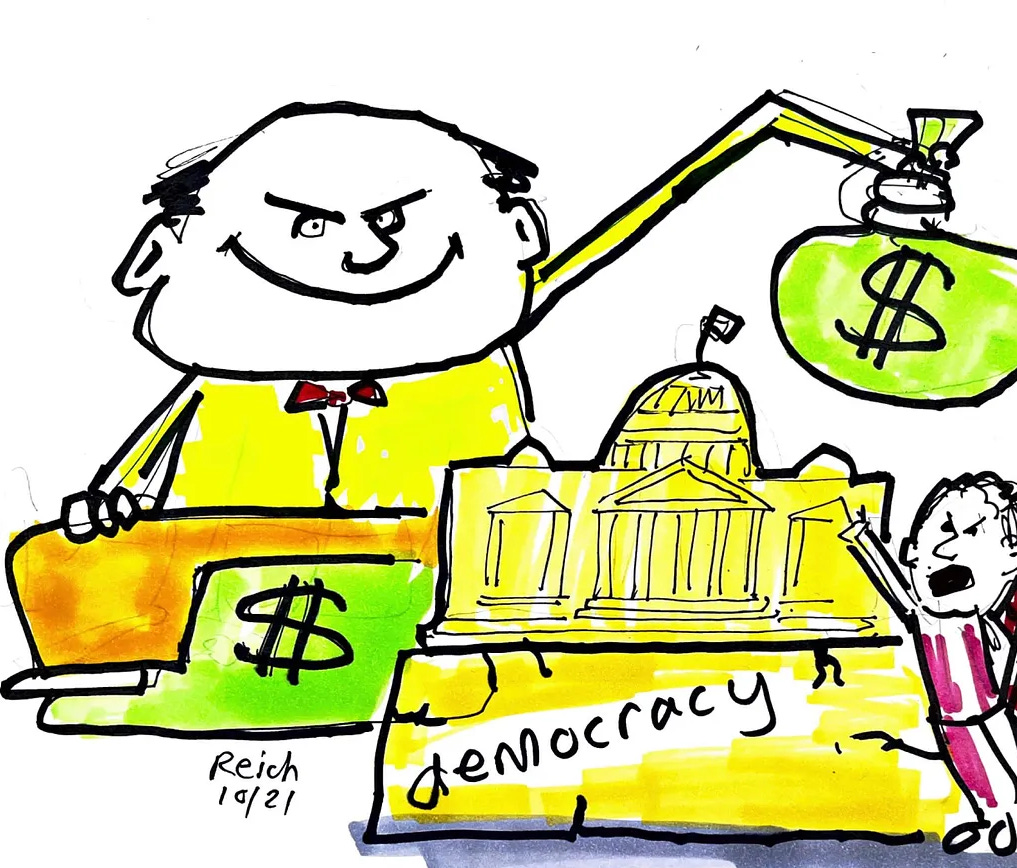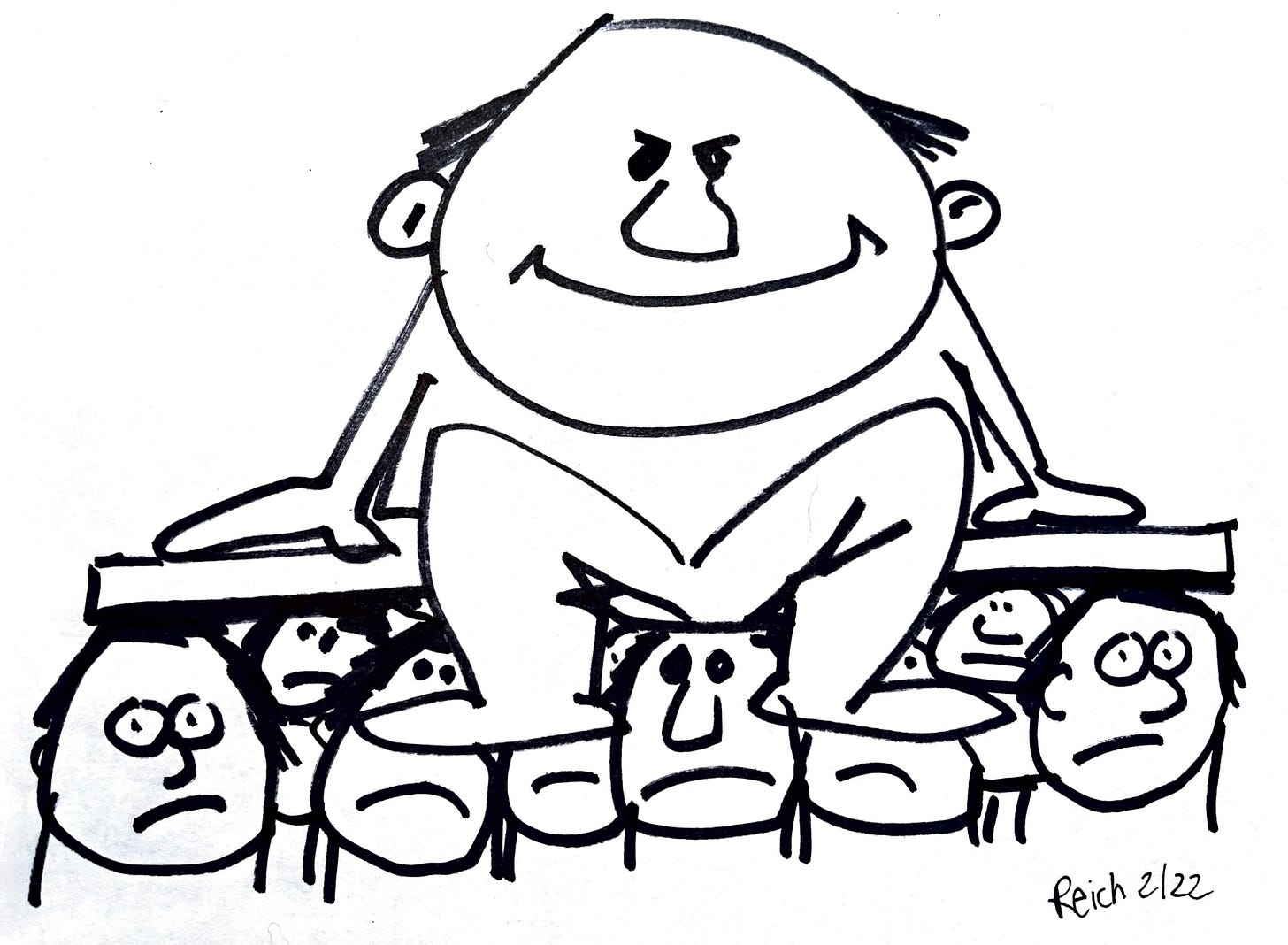How to Get Rid of "Citizens United". This is a bit more detailed, with references. It's a scheme, learned from conservatives, for how to dismantle the effects of Citizens United. Very clever. We have to do stuff like this to save our country, to get rid of the corruption in government.
We Means Test Food Stamps. Why Don't We Do the Same for Corporate Welfare?

Note from the author: These strategies are part of a broader framework for how states can assert power against a captured federal government. When federal institutions no longer serve democratic accountability, states have constitutional authority to act independently. For a comprehensive guide to the underlying principles of state-level resistance and autonomy, see The Existentialist Republic's first training educational booklet by clicking on the following text Intro to Soft Secession.
Elon Musk's companies extracted over $15 billion in government contracts, subsidies, and loan guarantees. He spent $277 million buying Trump's presidency. His reward: an unauthorized government position with authority over the agencies regulating his businesses and awarding him contracts. He used that position to systematically dismantle every oversight body investigating him. Federal law has banned government contractors from making political contributions since 1940 to prevent exactly this corruption. The ban exists because we know what happens when people buy political power with taxpayer money.
We're watching billionaires and corporations buy elections. Citizens United gave corporate spending constitutional protection. The Supreme Court's conservative majority will strike down any direct attempt to restrict it. So what do we actually do?
We can learn from one movement that beat the Supreme Court after fifty years of losing. The anti-abortion movement built a catalog of restrictions that chipped away at Roe. Courts struck some down. Others survived long enough to close clinics and restrict access. Each restriction tested different legal theories and created practical barriers during years of court battles. Eventually they had the votes to overturn Roe entirely. They became a voting block that political parties couldn't ignore.
Campaign finance reform can follow the same playbook. We don't try to win at the Supreme Court immediately. We create restrictions unclear enough to survive lower courts and generate years of appeals. During those appeals, the restrictions stay in force. We pressure test the system until we find vulnerabilities that let our agenda move forward. We build such a costly patchwork of state-level barriers that corporate political spending becomes legally risky and bureaucratically nightmarish even before courts finish deciding the cases. Restrictions that take five to eight years to reach the Supreme Court impose real costs during all those appeals. Ten states passing different versions at the same time creates compliance chaos that deters spending even while lawsuits drag on. Here are four approaches that exploit genuine legal gray areas and create multi-year court battles while we wait for Supreme Court composition to shift.
First, ban political contributions from any corporation receiving government subsidies or benefits. States already means-test individuals receiving welfare. Want food stamps, Medicaid, or housing assistance? You prove financial need and follow restrictions on how you use those benefits. Courts consistently uphold these conditions. We apply the same framework to corporate welfare. Federal law has banned government contractors from making political contributions since 1940. Courts uphold this ban to prevent pay-to-play corruption. States can extend this same principle to economic development subsidies, tax credits, and other government benefits. A corporation receiving state subsidies, tax breaks, or special financing deals cannot make political contributions during the time it receives those benefits.
The legal question courts haven't answered yet: how broadly can states define "government benefits" before this becomes unconstitutional? Does it only cover direct cash subsidies? Or does it include the tax breaks that almost every major corporation receives? Lower courts will disagree on whether this is a legitimate extension of existing contractor bans or unconstitutional overreach. That disagreement means years of appeals while the restriction stays in force. Corporations face the same choice welfare recipients do: follow the conditions attached to taxpayer money, or give up the benefits.
Second, direct state pension funds to dump investments in companies that spend heavily on politics and vote against corporate political spending proposals. Government has wide freedom managing its own money. State pension funds hold trillions in assets and vote those shares at company meetings. A state law telling pension fund managers to vote against any corporate political spending and sell off shares in companies spending over $1 million annually on politics passes initial constitutional review. The government isn't restricting anyone's speech. It's making investment decisions for public employee retirement funds based on stated principles: avoiding companies that waste shareholder money on politics serves fiduciary duty.
Maine passed a law in 2021 requiring its state pension system to divest from both fossil fuel companies and private prison operators. This established precedent for using pension fund investment policy as a tool for advancing state goals. California's pension systems adopted similar policies for thermal coal investments. Several other states pursued voluntary divestment through pension board decisions rather than legislation. The constitutional analysis for political spending divestment works the same way. Courts give government substantial freedom when it acts as a market participant managing investments rather than as a regulator restricting behavior.
Third, create expanded coordination rules that treat similar behavior patterns as proof of coordination. Citizens United only protected truly independent spending. The Court hasn't defined exactly where independence ends and coordination begins. Current federal rules focus on direct communication and shared consultants. State rules can go further. If outside groups and campaigns use similar messaging, target the same areas at the same time, or respond to each other's ads within 72 hours, state law can treat that as coordination. This exploits real legal ambiguity about what counts as independent.
Courts have struggled to define clear standards for how much circumstantial evidence proves coordination. Independent spending can be unlimited. Coordinated spending counts as contributions with strict limits. A state law with detailed behavioral triggers survives initial review in some courts and gets appealed in others. During that process, outside groups must operate under uncertainty about what triggers the coordination rules. That uncertainty stops spending because corporations can't risk having millions in supposedly independent spending reclassified as illegal contributions after the fact.
Fourth, coordinate identical disclosure laws across multiple states requiring corporations doing business in any state to disclose all political spending nationwide, including parent companies and subsidiaries. If ten blue states pass identical laws, corporations operating nationally face this requirement everywhere: do business in California and you must disclose all political spending everywhere, including what your subsidiaries spend in Texas. Do business in New York and the same requirement applies.
The disclosure requirement itself survives constitutional challenge because transparency is consistently upheld by courts. But requiring disclosure of activity in other states creates genuine legal ambiguity courts haven't resolved. Does California have authority to require disclosure of political spending that happens entirely in other states? Can states condition the privilege of doing business on disclosure of nationwide activity? Lower courts will split on these questions about the limits of state authority. That means years of appeals while corporations doing business in these states must comply with comprehensive nationwide disclosure showing every dollar spent, every recipient, every subsidiary's political activity, all in a public database. The compliance costs and public exposure during litigation stops political spending even before courts finish resolving the constitutional questions. States aren't forming a compact. They're each independently using their authority to regulate corporations doing business within their borders.
The goal is not winning at the Supreme Court. We're creating such costly and uncertain litigation across multiple states that corporate political spending becomes legally risky and bureaucratically difficult to manage. Four states banning political contributions from subsidy recipients means companies must track which benefits trigger which restrictions. Coordinated disclosure laws mean nationwide political activity becomes visible in ways that create public relations costs even if courts eventually limit how far states can reach. Pension fund divestment means companies losing access to trillions in institutional investment. Aggressive coordination rules mean outside groups can't function effectively without risking their spending getting reclassified as illegal contributions.
The cumulative effect across multiple approaches makes corporate political spending so difficult that many companies decide it's not worth the trouble even during the five to eight years before the Supreme Court potentially strikes down individual provisions. We're not getting around Citizens United. We're making corporate political dominance so expensive and complicated that we change behavior while we build toward the Court appointments that let us overturn Citizens United itself. That's what the anti-abortion strategy actually means. We lose most cases eventually, but we win the years of enforcement during appeals, and those years matter enough to justify the fight.
These strategies are part of a broader framework for how states can assert power against a captured federal government. When federal institutions no longer serve democratic accountability, states have constitutional authority to act independently. For a comprehensive guide to the underlying principles of state-level resistance and autonomy, see the Intro to Soft Secession.
REFERENCES:
American Tradition Partnership, Inc. v. Bullock, 567 U.S. 516 (2012).
Arizona Free Enterprise Club's Freedom Club PAC v. Bennett, 564 U.S. 721 (2011).
Buckley v. Valeo, 424 U.S. 1 (1976).
Citizens United v. Federal Election Commission, 558 U.S. 310 (2010).
Maine Revised Statutes Title 5, § 1957 (2021).
Maine Revised Statutes Title 5, § 1958 (2021).
Wagner v. Federal Election Commission, Civil Action №11–1841 (D.D.C. Nov. 2, 2012), aff'd en banc (D.C. Cir. July 7, 2015), cert. denied, 136 S. Ct. 895 (2016).








